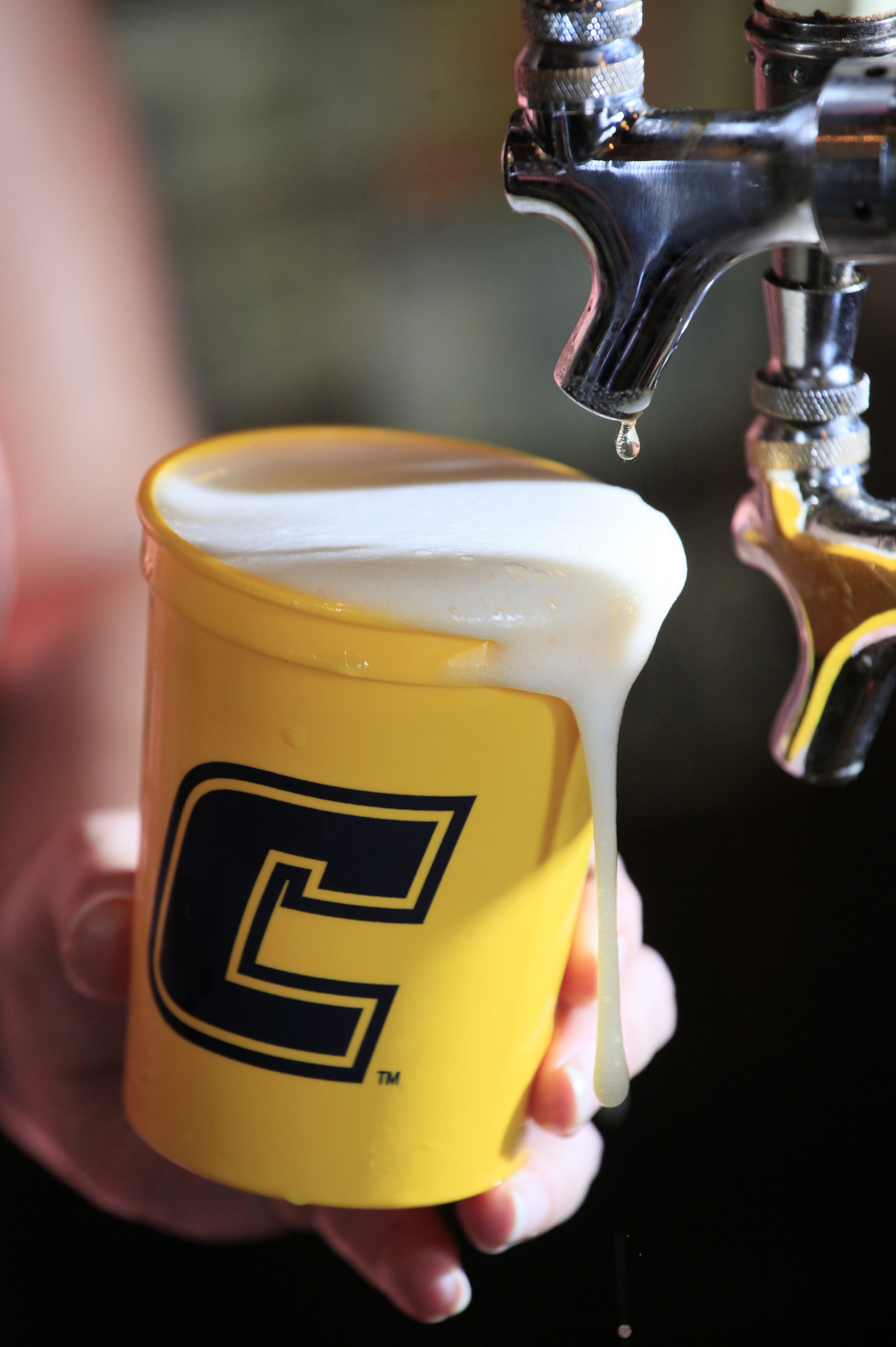If they pour it will you come? That's a question some UTC officials are asking after watching other college football stadiums start to sell beer during home games.
While beer is sold at Finley Stadium, home to the University of Tennessee at Chattanooga Mocs, in the stadium club and is available as part of a catering package in the luxury suites, it isn't sold in the concession areas. Nor is anyone allowed to leave the stadium club with a beer in hand.
Outgoing UTC Chancellor Roger Brown isn't immediately in favor of widespread beer sales at Finley, but he thinks it's an idea worthy of exploration.
"It may be the time has come," he said. "What you're hearing from me is a little, 'Well, you know, I'm watching, and it seems to be working other places.'"
The Liberty Bowl began selling beer at University of Memphis games in 2009. Beer went on sale at West Virginia games in 2011 and the University of Minnesota kicked off a two-year experiment selling beer and wine at its on-campus stadium last Saturday.
UTC set a season-ticket sales record of 2,527 in 2009 and set slightly higher marks over the next two years at Finley, which seats 20,668. However, as the excitement about the program's new direction has waned a bit following last season's 5-6 mark -- new coach Russ Huesman's overall record heading into tonight's home opener against Glenville State is 17-18 -- ticket sales are stagnant. As of midday Wednesday, season ticket sales were 2,512, putting UTC behind last season's mark of 2,761.
"We're shooting for breaking that [ticket sales] record, but we haven't been on a rocket, and we're looking for ideas," Brown said.
While the UT system bans alcohol on its campuses, Brown said there's no "hard-and-fast rule" that prohibits UTC from selling beer at the off-campus Finley. UTC rents the stadium for $10,000 per game and makes money from ticket sales, while the stadium gets a cut of the concessions and most of the parking revenue.
The decision on whether to serve beer won't be Brown's.
On Monday, Brown, who had previously said he would retire in March 2013, announced that he is stepping down on Sept. 20. University of Tennessee system President Joe DiPietro named Grady Bogue as the interim chancellor.
In addition, UTC is without an athletic director following the departure of Rick Hart to Southern Methodist University. Interim AD Laura Herron said the athletic department won't be tackling any major issues until a new athletic director is hired. Left up to her, however, there wouldn't be widespread beer sales at the stadium.
"I know there are a lot more people coming to games than students, but to me it sends a mixed message to our students and our student-athletes," she said. "If it's something the university wants to invest in, that's fine. Everybody's trying to make that dollar, and if that's the way they can do it, more power to them. I hope that's not an avenue we would take."
UTC SEASON TICKET SALES• 2012 -- 2,512*• 2011 -- 2,761• 2010 -- 2,676• 2009-- 2,527* As of WednesdayUTC AVERAGE ATTENDANCE• 2011 -- 10,436• 2010 -- 12,699• 2009 -- 10,503• 2008 -- 5,748Source: UTC
Even after beginning to sell beer, attendance at West Virginia games remained about the same last season, a little more than 56,000 in the 60,000-seat Milan Puskar Stadium. But according to a report from The Associated Press in February, beer and concession sales at WVU football games in 2011 totaled $1.26 million -- $744,082 without beer -- up from $613,651 in 2010.
At Memphis games, attendance has actually declined since 2009, from about 25,000 to 20,000 per game, but the Tigers have only won a total of five games between 2009 and 2011.
Attendance at UTC football games over the past three seasons has about doubled from the end of the former coach Rodney Allison's tenure. In 2008, when the Mocs went 1-11 during Allison's final season, the average home attendance was 5,748. In Huesman's first three seasons, the average has exceeded 10,400 each year.
When the Chattanooga Football Club was first conceived more than four years ago, the plan was for the amateur soccer team to play at Finley. Why? So beer could be sold at CFC's games.
"Culturally speaking, any time there's an outdoor sporting event, like CFC matches or football games, being able to buy a cold beer is part of the process," CFC general manager Sean McDaniel said. "It's what people expect to do at sporting events."
In four seasons, McDaniel said, CFC hasn't had any crowd trouble because of alcohol.
"Not once have we had an alcohol-related event that would cause any concern," he said.
Finley Stadium Executive Director Merrill Eckstein said selling beer beyond the luxury suites and stadium club would generate additional concession revenues, but it also would bring additional expenses such as increased security as well.
"There's no question in my mind that, if we could sell beer, it would increase the size of the crowd," Eckstein said.
If Finley's Stadium Corp. wanted to sell beer throughout the stadium, it could do so legally without UTC's consent, he said, but it has always chosen to abide by UTC's wishes.
Without turning their games into Bourbon Street, the Chattanooga Lookouts and Chattanooga Football Club serve alcohol at their sporting events "and the stands are full of underage people and children," Brown said.

